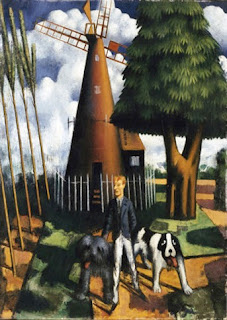Found- a press cutting from The Bookman, March 1932 by one De V. Payen-Payne, a good evaluation of the life and work of C. K. Scott Moncrieff – in a review of a posthumous book by him. It may be a myth or an exaggeration but I heard that Scott-Moncrieff was working on his monumental Proust translation while on the staff at The Times and occasionally when he was stuck for the English mot juste (as it were) he would consult the entire office and everything came to a halt while the right word was found – world news be damned!

Painting of Scott Moncrieff by E S Mercer
It is a moot point whether a mother or a wife or any near relative can write the ideal biography. Not that this book pretends to be a biography, although it contains many details that only a mother can give, and will prove invaluable when the ideal biographer appears, and Scott Moncrieff’s work is assessed critically and compared with the lit he led. Some may think that too much space has been given to his experiences in the War and to the letters that he wrote to his family and friends when on service. Since 1918 we have a large number of such accounts, and Scott Moncrieff’s adventures, although most creditable to himself, were not very different from those of many other intellectual men thrown into the cortex of combat. Others too may think that the postscript is too personal for inclusion. Instead of it, an index would have been a desirable adjustment. Continue reading



